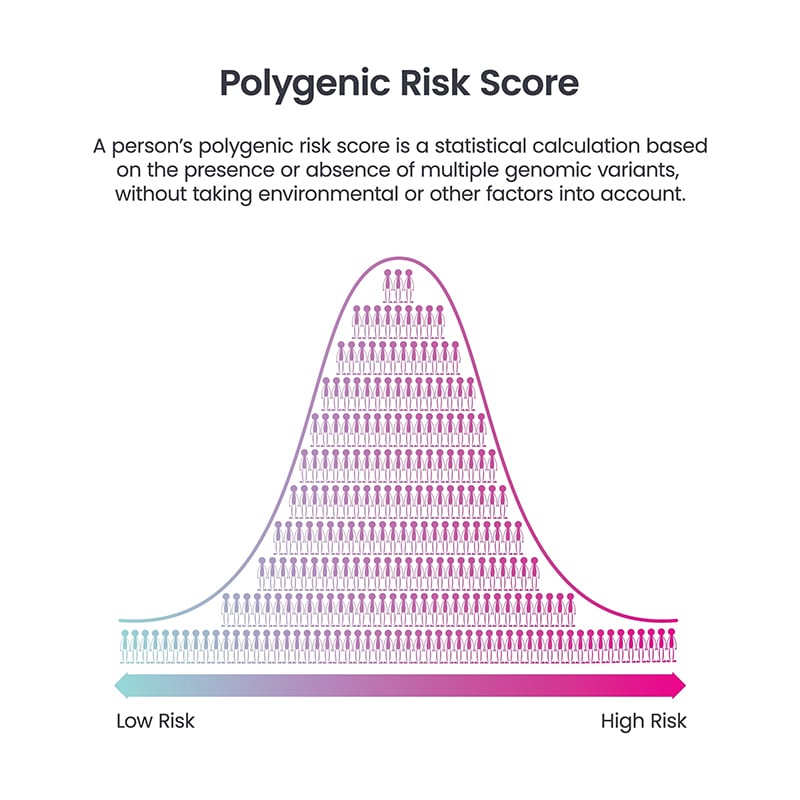POLYGENIC RISK SCORE (PRC) IN CARDIOVASCULAR DISEASES

Understand your risk. Ensure your heart’s heart.
Get to know “Polygenic Risk Score”
The role of genetic testing in cardiovascular diseases Despite the advances is cardiology, including diagnostic approaches and treatments, the incidence of heart diseases continues to rise. The best possible way, in fact, is to prevent heart diseases by minimizing the risks of each individual while taking into account genetic diversity as genetic factors likely play significant roles in developing certain inherited heart conditions. Polygenic Risk Score is a genetic test intended to estimate the relative risks of developing certain heart diseases. While taking individual’s risk factors into account, the result is calculated according to an individual’s genotype profile compared to the general population. Those with higher scores are more likely to develop heart diseases. Therefore, to lower the risks, lifestyle modification is strictly indicated along with regular screening and regular follow-up, allowing effective and prompt treatment whenever needed.
What is Polygenic Risk Score? What is it for?
Polygenic risk score (PRS) is a genetic screening test used to potentially identify genetic susceptibility to certain heart diseases, particularly coronary artery disease and atrial fibrillation – an irregular heart rhythm (arrhythmia). The estimation of an individual’s genetic liability obtained from polygenic risk score is calculated according to unique genotype profile compared to general population, guiding for personalized preventive measures to lower the risks.
- The importance of Polygenic Risk Score
Polygenic risk score testing can estimate the risks of developing heart disease in people of all ages even there is yet alarm sign. While taking into consideration of individual’s risk factors, proactive healthcare initiatives and appropriate interventions or treatment plans can be further made in order to minimize the risk of developing the diseases in the future hinging on unique genetic profile of each person. - Who should get Polygenic Risk Score testing and when?
Everyone regardless of gender or age can get polygenic risk score testing at any time. However, this genetic test is highly advised in people aged over 40, people with risk factors, e.g. hypertension, diabetes or dyslipidemia and people with family history of heart disease. Since the test only requires blood sampling, no contrast media or radiation is given, it is considered safe and practically useful.

Results obtained from polygenic risk score testing
- How long does it take to get the result?
Due to advancement in genetic sequencing technology implemented in Bangkok Hospital, polygenic risk score testing can be carried out domestically. The result can be usually obtained within 4 – 6 weeks. - How is the result interpreted?
The result is calculated and interpreted as according to an individual’s genotype profile and relevant genomic resources compared to the general population. The result is reported as the risk levels, ranging from lowest to highest quintiles of genetic risks of the general population. Once obtained, the cardiologist will then conduct genetic counseling on how to personalize preventive plan best suited for each individual. Considered personal data, the result is strictly kept and protected concerning the PDPA. - What to do if the result is positive
If the result indicates high risk of developing heart diseases, e.g. coronary artery disease, atrial fibrillation and other forms of heart diseases, additional investigations and tests are needed, such as risk stratification enabling the cardiologist to identify the right level of care and services for distinct subgroups of patients.
Commonly asked questions regarding polygenic risk score testing
- How accurate is polygenic risk score?
Due to rapid evolution of genetic sequencing technology, genetic testing offers ultra-high throughput, scalability and speed with high sensitivity to detect a number of genetic alterations covering pathogenic ones that are highly likely to induce the disease. Advancement in the Next-Generation Sequencing results in an improved risk prediction accuracy, especially when the available genomic resources are growing. - What do I have to do if the result is positive?
In case that a person poses high risk of developing heart diseases, it becomes crucial to gear towards lifestyle modification to keep all risk factors under control. Early tests or investigations might be needed according the recommendation of the cardiologist. - How often do I have to get this test?
Polygenic risk score is used to estimate an individual’s lifetime genetic risk based on genetic makeup, therefore only a single test is suggested. Nevertheless, more pathogenic mutations among populations might be exceedingly detected in the future, hence the genomic references will be subsequently updated, affecting the result interpretation.
Why should I get polygenic risk score testing at Bangkok Heart Hospital?
At Cardiovascular Genetic Clinic, Bangkok Heart Hospital, we offer a broad range of genetic testing including polygenic risk score performed by the expert cardiologists and geneticians. Combining polygenic risk scores with other contributing factors that affect disease risk, personalized preventive plan can be initiated to lower the risk while ensuring good overall health and well-being in the long run.
Tailor Your Life. Understand your risk.
Ensure your heart’s heart.

